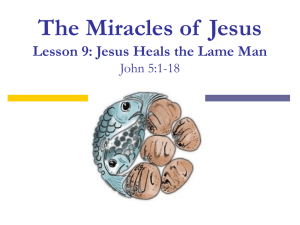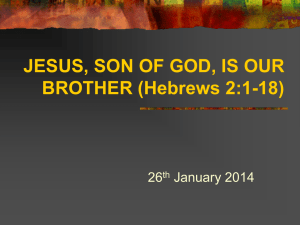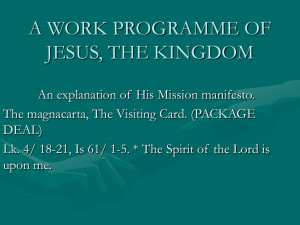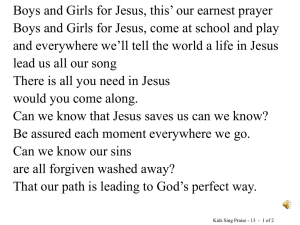02 Cripple by Pool
advertisement
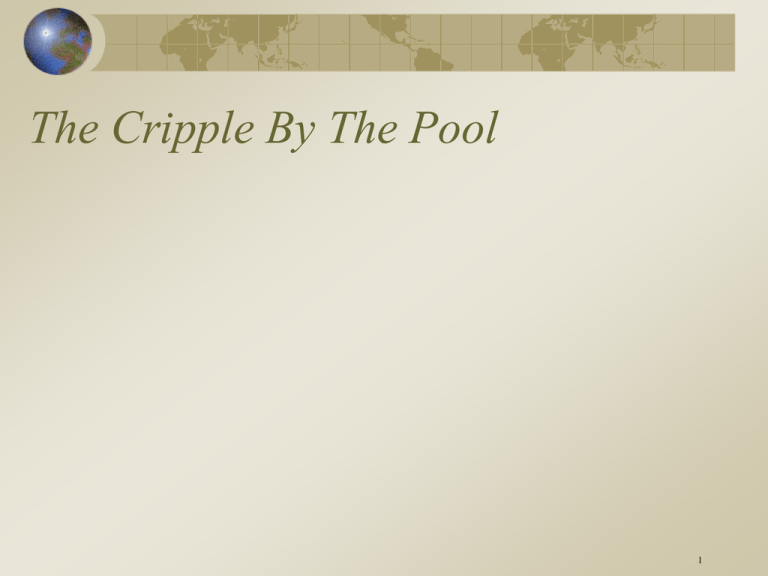
The Cripple By The Pool 1 John 5:1 – Which Feast? • Three of the feasts required attendance (Ex 23:14): – Passover (Ex 23:15; Lev 23:4-14). – Weeks (Ex 23:16; Lev 23:11, 15-17) – Ingathering, or Tabernacles (Ex 23:16; Lev 23:34-43). • Other suggestions include Trumpets (Lev 23:24, 25). • But John calls the passover a feast of the Jews (RSV): – 2:13 ... “The passover of the Jews ...” – 6:4 ... “The passover, the feast of the Jews ...” – Only other time a feast is called a Jewish feast is in John 7:2 – referring to the Feast of Tabernacles. • So we’ll assume John 5 was a passover, the 2nd of 4 in John, thus justifying a 3 1/2 year ministry for the Lord. 2 Cripple By Pool Centurion’s Servant Epileptic Child The Man with Dropsy Woman Taken in Adultery Fourth Passover, Thu, Apr 4; Jesus 33/34 January 1, AD30 Tabernacles Transfiguration Third Passover; Jesus 32/33 January 1, AD29 Sermon on Mount Second Passover; Jesus 31/32 January 1, AD28 First Passover; Jesus 30/31 January 1, AD27 Ministry begins; Jesus about 30 A Time-Line for Jesus’ Ministry Zacchaeus 3 “The Jews” in John In John’s gospel, “the Jews” may mean different things: 1 Any descendant of Jacob. For example, John 4:9, 22. 2 The Jewish establishment, the sanhedrin, or its sympathisers. For example, cp John 11:46-53 with John 18:12, 14, 31. This is the usual meaning of “the Jews” in John’s gospel. “The Jews” often means the Pharisees. Cp John 11:46, 47; 18:14. 3 In a few cases it may mean an inhabitant of Judæa or Jerusalem. For example, John 7:1; 11:54. This application is difficult to distinguish from number 2, above. 4 Bethesda / Bethzatha A pool near to Jerusalem’s Sheep Gate. Called Bethzatha in RSV. Called Bethesda in KJV and NIV. NIV footnote: “Some manuscripts Bethzatha; others Bethsaida.” Bethesda: House of mercy; Bethzatha: house of olives; Bethsaida: house of fishing. Bethzatha: A variant spelling for Bezetha - the name of that part of Jerusalem that lies north of the temple mount. 5 5 Sheep/Lions/ St Stephen’s Gate In the eastern wall of Jerusalem North of the temple mount 6 Bethzatha Pool Scholar’s model. View looking southwest, showing the Tower of Antonia And Herod’s Temple An 1888 Excavation in NE Jerusalem uncovered a 5-porch pool with angel and water fresco. It may have been the pool of Bethesda. 7 Text of John 5:3b, 4 NAB has a footnote: “Toward the end of the second century in the West and among the 4th century Greek Fathers, an additional verse was known: “For [from time to time] an angel of the Lord used to come down into the pool; and the water was stirred up, so the first one to get in [after the stirring of the water] was healed of whatever disease afflicted him.” This verse is missing from all early Greek manuscripts and the earliest versions, including the original Vulgate.” 8 Troubling of The Water Modern versions omit John 5:3b, 4. However: If spurious, at least the cripple thought the water had power to heal. See John 5:7 (which is not contested). Some disturbance of the water is implied for otherwise why were the sick folk merely waiting by the pool? If the curative powers were in the water (rather than its disturbance), why should it matter to the cripple if another should step in before him? In which case: Did an angel really stir up the water? Or should the text read, “For it is said that an angel went down at a certain season ...”? 9 There Were Many Sick Folk ... • But the Lord chose only one ... – So his purpose must have been to teach! – The cripple had been unable to rise for 38 years. • Is this a reflection of Israel’s 38 years in the wilderness? – Deut 2:14 (cp 2 Chron 16:12, 13) • The Lord went on to discuss resurrection – John 5:21-29. • So the man may be regarded as representing Israel’s prostration due to sin – see John 5:14. • The healing showed Jesus’ power to deliver from sin (vs 14) and to fulfil, for example, Ezek 37. 10 Preconditions for Healing • Prostrated by Sin (vss 6, 14). • Chronic condition (vs 6). • “Do you want to be healed?” (vs 6, RSV). – Salvation depends on some effort of will. – Greek: Theleo indicates determined wish. – AV: “made whole” – it’s not something we can do for ourselves. 11 I Have No Man (vs7) • He knew he was powerless to act alone. • So why was he there? • Doubtless unknowing, virtually verbatim quote from Isa 59:16. – Very similar to Ezek 22:30, Jer 5:1. • In fact, he had “a man” – “Behold the Man!” (John 19:5). 12 Three Steps to Salvation (vs 8) • Rise! – Disciples aspire to higher and wider horizons (Col 3:1). • Take up your bed … – Disciples are carriers, not merely the carried. – “If any man would come after me, let him deny himself and take up his cross daily and follow me.” (Luke 9:23, RSV). • Walk! – Discipleship demands forward progress. 13 Why Did Jesus Depart? (vs 13) • Because of the crowd – the man needed time and space to work out the implications of his healing. – This is worked out in conflict (vss 10-13). – Conflict is created by doing what Jesus asks! • Jesus later found him in the temple … – Had he gone there to give thanks? – It seems that Jesus was looking for him. – If so, Jesus finishes what he starts. 14 Thou art made whole… (vs14) • Made whole – we are utterly dependent upon the Lord’s grace. • Sin no more – was this man’s condition the result of a particular sin? – Perhaps, but not necessarily. • A worse thing – as in the parable of the swept house (Luke 11:24-26). • Or Hebrews 10:23-29. 15 He went and told the Jews (vs 15) • Was he keeping “on side” with them? Was this a betrayal of the Lord? – It certainly had that effect! (vs 16) – So was he still acting as a model of his people? (eg John 1:11) • Or had he realised that the leaders needed help just as he had, and that they could only obtain that help from the Lord? 16 Three Issues Arising ... • It was the sabbath; the man was carrying his bed; the Jews objected – vss 9-11, 16. – They found fault with Jesus. But what of those who had carried the man there? • The Jews challenged Jesus’ God-given authority – vss 17-23; vss 30-47. – Even Jews could see that only God had power for such a healing – implication of vss 17, 18. • Two aspects of resurrection – vss 24-29. 17 Two Aspects of Resurrection • Vs 25 is about a “here and now” raising from “death” to (the new) “life”. – The hour ... now is (vs 25). – Refers to a present response to Jesus’ teaching (leading to baptism) - vss 24-27. • Vss 28, 29 are about a future raising from the grave when the kingdom comes. – The second raising depends on the first! 18 Summary • Only Jesus has the power to raise those who are prostrated by sin. • Jesus has power over all things – even over legalistic views of the laws of God. • Salvation is available only to those who will exert some effort to attain it. 19 The Cripple By The Pool 20





